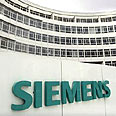

The increased international sanctions imposed against Iran have prompted the Islamic Republic to seek out grey areas between the UN, US, and EU approaches to sanctions in a bid to promote its nuclear program unhindered.
Western sources cited Monday in the Wall Street Journal that Iran is increasingly relying on a small Iranian-owned bank in Germany to conduct business for companies blacklisted under international sanctions efforts.
According to the said sources, European-Iranian Trade Bank, also known as EIH Bank by its German initials, whose offices are located in Hamburg, has recently carried out billions of dollars worth of deals for Iranian companies tied to Iran's conventional military and ballistic missiles programs. All of these companies are banned under UN, US, and EU sanctions. Among them are Iran's Defense Industries Organization, the Aerospace Industries Organization and the Iranian Revolutionary Guard Corps.
For example, in a 2009 sanctions evasion scheme, EIH Bank made bank transfers for Sepah Bank, which takes part in Iranian weapons trade and proliferation and is subject to broad US, UN, and EU sanctions. It is unclear what was transferred to Iran in these deals or the identities of the people behind them.
EIH Bank is on the US Treasury Department's black list. Sanctions imposed by Washington were heightened last month when US President Barack Obama signed a bill forbidding banks and companies with ties to Iran's blacklisted companies from doing business in the US.
Who sets the standard?
A spokesman from Germany's banking oversight agency said that the UN sets the standard for sanctions against Iran, not the US. EIH "is not mentioned in the UN Security Council resolutions," and therefore may operate freely under German banking law, the spokesman said.
It should be noted that there are four Iranian banks registered in Germany, and the EIH is the only one not subject to any oversight.
However, this is likely to change in coming weeks. On July 26, European foreign ministers are scheduled to meet in order to discuss sanctions on Iranian trade relations.
"Consultations are under way at the European level to decide whether other institutions should be designated with sanctions," said Tobias Pierlings, a spokesman for Germany's Economics Ministry. "The prerequisite for any designation is concrete evidence of participation by the person or entity in proliferation activities."
Critics of the sanctions regime claim that the lack of coordination among the UN, US, and EU allow Iran to exploit existing loopholes in order to continue funding its nuclear aspirations.
Despite political tensions, Germany has been and remains Iran's largest trading partner in Europe. Though companies like Siemens have committed to cut off ties with Tehran, the trade volume between the two countries reached $1.8 billion in the first quarter of 2010, a 20% increase from the same period in 2009.
- Follow Ynetnews on Facebook















